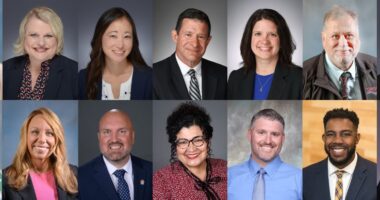Be Your School’s Inspirational Leader: Key Steps
At #naesp16, Baruti K. Kafele, author of The Principal 50: Critical Leadership Questions for Inspiring Schoolwide Excellence, spoke passionately about student, teacher, and principal empowerment. As an accomplished former principal of 14 years in East Orange, New Jersey, and other New Jersey schools, he has been part of and seen many schools that overcame the odds. These were the schools where the principal said, “This school is soaring, or it will soar because I lead it.”
Session: Critical Leadership Questions for Inspiring Schoolwide Excellence
Speaker: Baruti K. Kafele, Education Consultant / Speaker
Key Takeaway: Know your leadership style, strengths, and vision. Craft “signature moves” that align with your brand of leadership.
This, said Kafele, is “the leadership conversation you have [with yourself] in the mirror.”
Making Students into Believers
Many students, said Kafele, do not see the connection between effort and success. No matter what lessons are preached at school, a child with poor circumstances at home returns to the same conditions after school.
“How do you make a believer out of that student? How do you review the films to help make that student see the possibilities?” he challenged principals. “Ask yourself, did I somehow forget the human side of the child?”
Kafele told a story about how, when he flew into Washington, D.C., for #naesp16, he stayed in the airport for an additional two hours. He was there, he said, to meet pilots. He tried to find a pilot who looked like the boys he works with in schools, but he couldn’t spot any black pilots. Perhaps plenty of students have the skills and abilities to become pilots, but they can slip through and settle for another job. Leadership helps children see new possibilities, he said.
“You don’t need a superintendent to tell you your effectiveness. Instead, you look in the mirror every day. The core question is, ‘Did I make the child believe [in himself and new possibilities]?’”
When he was a rookie principal, Kafele explained, he wanted to close the achievement gap. But he realized that students on the “wrong side” of the achievement gap were brilliant and extraordinary, so he refocused on closing the “attitude gap”—zeroing in, he said, on the will not the skill.
“You’ve got young people in your school, who are brilliant and extraordinary, but do not possess the will to be great. We have to ask ourselves, what happened to the will? For students? Or staff? How do you get that teacher to believe in the child? How do you inspire schoolwide excellence?” he said.
Signature Leadership Moves
Perceptions of how we inspire excellence in our schools matters, argued Kafele. If your school community perceives that the principal does not inspire excellence, that’s a problem. He encouraged principals to consider their leadership identity. What do you want people to think about who you are and what you bring to your school?
For example Kafele said he wanted to be a model of manhood for black students. This, he said, became his identity. A leader, he said, has “signature moves.” He developed his own signature schoolwide morning message of intentionality.
“When we use language to describe our schools like, “the Mighty ___ School” or “the ___ School of Excellence,” it creates magical moments for kids,” he said. “Being intentional leads to a higher chance of success. The intentionality of what they experience matters.”
Principals should aim to create a magical, memorable place that sticks with kids for life.
Tips and Self-Reflection
Kafele closed with final points for principals to remember:
- Leadership changes students. It helps them reimagine their purpose. Principals should clearly define their leadership principles and what drives them.
- Forge your vision. Consider what you want your school and your leadership to look like one year from now. How will you have grown? Test scores will rise as you (the principal) are en route, he said.
- Who we are is not good enough. Constant growth is key. Kafele encouraged principals to visit the hashtag #neversatisfied.
- Instructional leadership required inspiration. Teachers should see you as the major resource that makes them sharper and better, gives them information and feedback, and offers a source of inspiration. Ask, “Am I my school’s inspirational leader? In what ways do I bring enthusiasm and energy? Have I intentionally brought enthusiasm and energy into the building?” Kafele said.
- Self-reflection is essential. In his presentation, Kafele used the metaphor of a sports team watching films of past games to analyze their plays. “How often do you analyze your films?” he challenged principals. “What is that you bring, relative to your skill and ability? Are your actions consistent with your behavior? What evidence do you have of this?”
Sandra A. Trach is special assistant to the superintendent at Lexington Public Schools in Lexington, Massachusetts.




